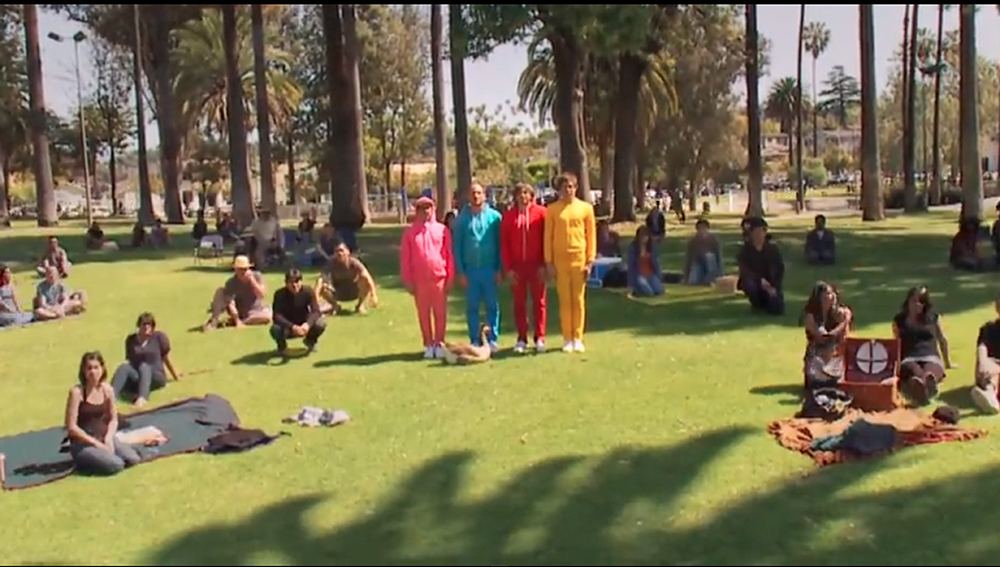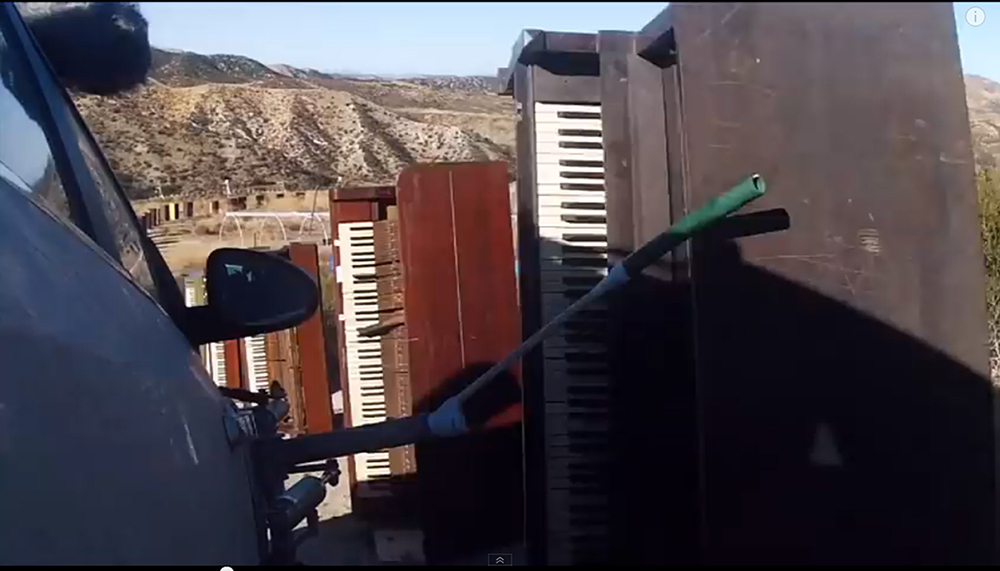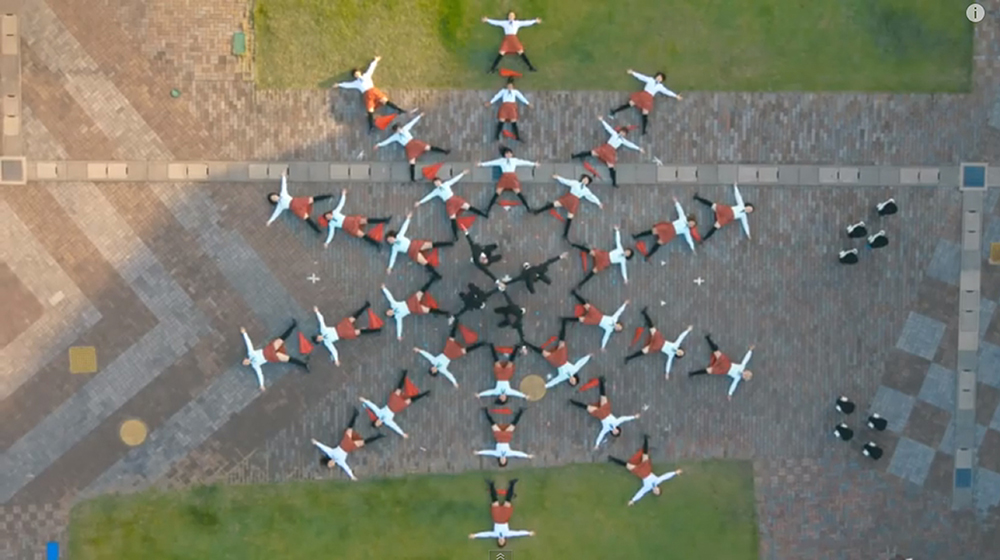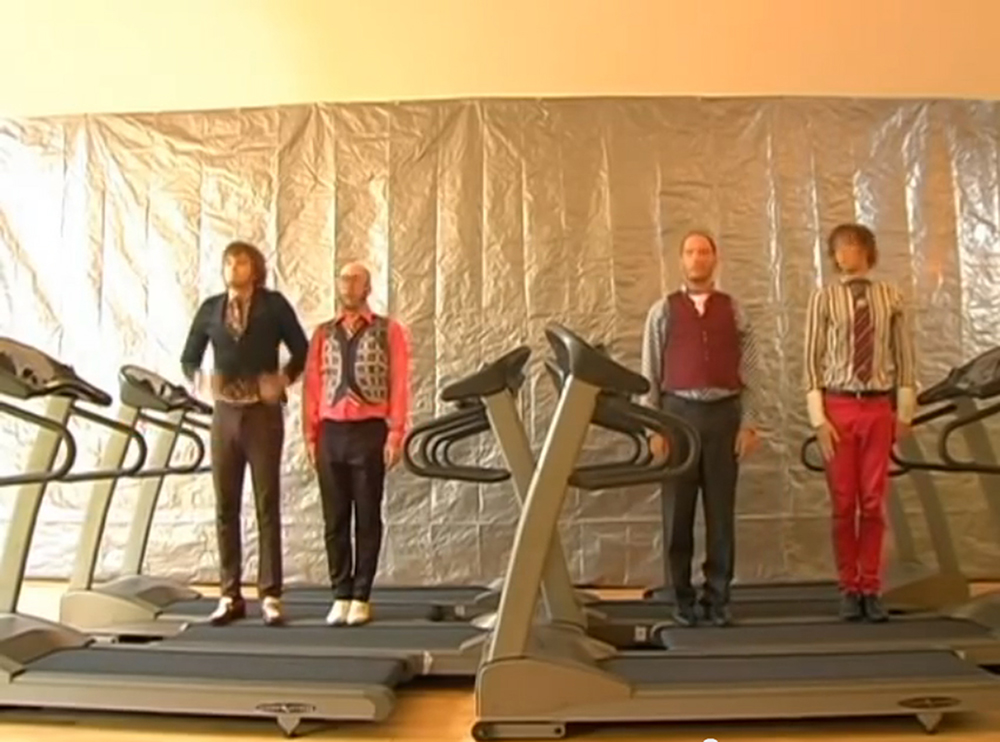“When really great things happen, it’s usually because people lose their sense of authorship and chase whatever is the best idea.”—Damian Kulash
Damian Kulash: Lead Singer, OK Go / Los Angeles CA
okgo.net
“when really great things happen, it’s usually because people lose their sense of authorship and chase whatever is the best idea.”—damian kulash
How similar are the processes of creating a song versus a video?
It is a little different, but not as much as people think. One thing that is notable about our process is how much we invest in play, the theory of discovery, and trial and error. This process is more common in music than it is in filmmaking, so I will compare those. The process for making movies is this: you sit at a desk and come up with the entire thing, basically. You get your script, your storyboard, what you shoot with, and once it’s time to shoot, you have every minute planned. It is super efficient. That way, you aren’t wasting any resources by renting equipment that is just sitting there while you’re still figuring out what you are going to do. The problem is, you are limited to the ideas that you have at a desk. There isn’t much room for revision, or rethinking something, or heading off in a totally different direction. So our filmmaking process is to come up with the basic rules for the idea, to come up with the general area in which we are going to play, and then play in it for a very long time and only shoot after that.
Music is sort of the same thing. Early in my career, I remember writing with a much more goal-oriented approach, where I would think, for instance, why don’t people write stadium rock anthems anymore? And then I’d try to write a stadium rock anthem. You can get good results that way, but it is hard to stumble across and discover things if you already know which way you are headed. So these days, our music process is a lot more like our filmmaking process, where we basically just play with the fundamental building blocks of songs: beats, chord progressions, melodies, sounds, etc., and look for those moments where something wildly emotional jumps out. A lot of times, we have sounds that go together. But sometimes, we get this crazy ball of emotion that comes out of nowhere. Usually we are pretty surprised where we find that, because it’s not at all where we would have headed. I find that a much more adventurous way to create.
Is collaborating on a song within the band very different from working with outside groups and individuals on a video?
It is a matter of scale. In either process, it’s about getting people doing what they showed up to do, and having some people working on great ideas that they didn’t see coming. When it’s just the four members of the band, plus a producer, the boundaries between roles are pretty fluid. You need enough of a structure so that there’s a place where the buck stops. There’s a place for the final decider on things if people can’t come to it organically. But other than that, you don’t need more structure, it’s basically people just into the sequence of play. On a film set, you need slightly more structured roles, but we try to keep them as fluid as the projects can endure. For instance, when we are working with dog trainers, they end up doing a lot of choreography with humans, just because they have a great way of thinking about it. For me, the key in collaboration is to be confident enough in what you believe, so that everyone in the room feels that the best idea is going to win. It’s not about someone’s ego, or someone’s preplanned anything. When really great things happen, it’s usually because people lose their sense of authorship and chase whatever is the best idea. The band has been working together for 15 years, and we’ve known each other for much longer, so we don’t need to convince each other of that anymore. We know that if someone chooses an idea that’s their own, it’s because they think it is the best idea, not because it’s theirs. It seems like a small thing but losing that sense of self is really important to good collaboration, so that you can be surprised by where an idea goes, which means that you get the best of all of the brains, rather than just being together in a back room.
All is Not Lost
commissioned by google chrome
When we are collaborating with another group, like when I am directing with other directors, there is generally a time period that you have to learn about each other and get comfortable. You get to the point where people trust that the people making the decisions are doing so for the right reasons, not because they are being defensive. We have done it a lot, and we have done it with a lot people we didn’t know all that well when walking into the room. We’ve gotten pretty good at establishing a lighthearted work mode, where we all realize that we’re here to make something awesome, so let’s just do it.
End Love
directed by lieberman + gunther
Do you find a benefit to working in person versus online?
We get better results—and a lot more surprising results—faster when we are in proximity. But it is not always possible to do that. With music, we are not just there to jam things out. You need to have enough of a structure. I think of it as like cloud seeding. You need the crystals there for the water droplets to hang onto. Usually, we work fairly separately for a few weeks or months, getting little snippets of things together that we can then throw into the sandbox and play with together. Generally, in the beginning, we work in solitude, and then bring it together a quarter or half way through the process. Filmmaking tends to vary. It just depends on what the idea is. There are some things that you have to be in the same room for, and some things that are just a matter of playing with the idea.
Needing/Getting
produced by brian l. perkins
Are there specific considerations when working with volunteers versus an organization?
From purely a logistical perspective, volunteers can be dangerous because if somebody doesn’t show up one day, you’re screwed. On the other hand, volunteers are working because they want to be involved in something that they think is really awesome. I love working with volunteers because they are there for the right reasons. They are there because they really want to be a part of making something, and they want to be a part of something bigger than what they could do themselves. Across the board, the bigger the group of people working on something, the more likely people are going to have highly segmented roles, and the more likely people are to be jaded and professional about what they are doing, as opposed to naïve and full of commitment. It is always our role to try to keep everybody loving the actual thing that we are making.
I Won’t Let You Down
co-directed by kulash + kazuaki seki
We are frequently on film sets with film professionals, and our type of thing with filmmaking is so uncommon that we sometimes get to see some jaded old grip get really excited about something, because he’s been shooting the soap opera for the last 20 years. He gets excited about creating something in a different way.
We encourage everyone to voice their ideas during all parts of the process. With the type of projects that we are doing, there is a sense of risk, and because we do so many things in single shots, there is a pretty high chance that many times we won’t actually get the thing that we came for. In normal commercial shooting, for an actual commercial for TV or something, the difference between good and bad is a good and bad shot. If you are not very good at this, you are going to end up with something that is sort of B grade. If you have a bad day, you’ll get three takes of each shot instead of six takes of each shot, and you have less to edit from. But the entire thing depends on each shot at each moment. Whereas with our projects, it is all or nothing, so you get a much closer sense of team and investment. It is a very infectious type of creative lustiness: you are all going through this thing, and if anyone’s part sucks, the entire thing falls apart.
Here it Goes Again
directed by trish sie and band
Are the intents heading into a song versus a shoot very different?
One thing with video is that the song already exists. There is an emotional roadmap that you’re starting with that you don’t have when you’re starting a song. With a song, I feel like we are much more hunting in the dark, like we are in this room with the most interesting hallway out of there for a connection. In both cases, it is about trying to give people a real emotional journey. And I don’t think people usually think of video that way. I am not used to seeing performance videos that have that type of arc.






